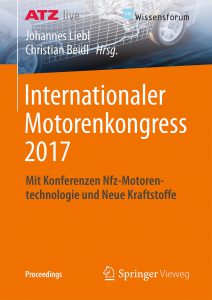Ob es Sinn macht Verbrennungsmotoren weiterzuentwickeln, darüber ist sich die Welt der Automobilentwickler heute nicht einig. Für die einen sind Verbrennungsmotoren ein wichtiger Bestandteil der zukünftigen Mobilität. Für die anderen sind sie ein Überbleibsel aus einer längst vergangen Zeit.
Sieht man den Verbrennungsmotor als wesentlichen Bestandteil zukünftiger Mobilität, muss man ihn effizienter und emissionsärmer zu machen. Die hohe Energiedichte flüssiger Kraftstoffe wird wesentlich dazu beitragen, die heute gewohnte Langstreckentauglichkeit von Pkw und insbesondere von Nutzfahrzeugen auch morgen noch sicherzustellen.
Die Vorträge sind in der Regel Englisch.

Vortragsband Internationaler Motorenkongress 2017
Vorwort
HERZLICH WILLKOMMEN
Verbrennungsmotoren weiterzuentwickeln, sie effizienter und emissionsärmer zu machen, bleibt ein Schlüsselfaktor. Denn die hohe Energiedichte flüssiger Kraftstoffe wird wesentlich dazu beitragen, die heute gewohnte Langstreckentauglichkeit von Pkw und insbesondere Nutzfahrzeugen auch morgen noch sicherzustellen.
Der 4. Internationale Motorenkongress legt deshalb besonderen Wert darauf, aktuelle Trends in der Antriebsentwicklung im energetischen Gesamtsystem zu betrachten. Effiziente Pkw- und Nfz-Motoren sind darin genauso entscheidend wie synthetische Kraftstoffe, um künftig eine weitgehend CO2-neutrale individuelle Mobilität sicherstellen zu können.
Sichern Sie sich Ihren Wissensvorsprung und profitieren Sie!
- Es erwarten Sie internationale Referenten, hochkarätige Vorträge und Diskussionsrunden.
- Sie haben jederzeit die Möglichkeit, zwischen allen Vorträgen zu wechseln.
- Nutzen Sie den Kongress zum Netzwerken – der Abend der Motoren-Community bietet interessante Gespräche in angenehmer Atmosphäre.
- Eine begleitende Fachausstellung informiert über innovative Produkte und Dienstleistungen im Bereich Verbrennungsmotor-Entwicklung. Wir freuen uns auf Ihre Teilnahme!
Im Namen der Programmbeiräte
Dr. Johannes Liebl
Wissenschaftlicher Leiter des Kongresses, Herausgeber ATZ | MTZ | ATZelektronik
Inhaltsverzeichnis
PLENUM
- Propulsion for 2025
- Worldwide harmonization of emission regulations – a dream never becomes reality?
- Climate-neutral mobility
TEIL I – PKW-MOTORENTECHNOLOGIE
MOTORENKONZEPTE
- CNG as ideal supplement to e-traction aiming at CO2-neutral mobility?
- Challenges facing future high performance combustion engines using Porsche Boxer engines as an example
- Load point shifting for Diesel engines – potentials for passenger car and truck engine applications
LADUNGSWECHSEL UND VERBRENNUNG I
- Selecting a suitable stroke/bore ratio when combining variable compression and Early Intake Valve Closure (EIVC)
- Extreme lean gasoline technology – best efficiency and lowest emission powertrains
- From glow tube to corona – challenges to the ignition systems of future SI engines
SYSTEME UND METHODEN
- Experimental investigation of the cold start behavior of different coolant circuits for a waste heat recovery system and their influence on the engine
- Method for the predictive calculation of mixed friction
- Predictive diagnostics solutions beyond big data
EMISSIONEN
- Optimized heat release rate for enhanced thermal efficiency under NOx, noise and peak firing pressure constraints in light-duty Diesel engines
- Impact analysis of fuels, operating fluids and combustion parameters: focus raw emission behavior
ELEKTRIFIZIERUNGSKONZEPTE
- FEV ECObrid – a 48V mild hybrid concept for passenger car Diesel engines
- The tailored powertrain for 48V – options for the gasoline engine – chance for future Diesel engines
- Optimal hybrid gasoline engine – solutions for complex powertrains
LADUNGSWECHSEL UND VERBRENNUNG II
- Model-based combustion chamber layout for passenger car Diesel engines
- Targets and parameters for combustion system layout
48 VOLT IM SERIENEINSATZ
- 48V in series application
- Deployment of 48V in Renault, current status and future outlook
TEIL II – NEUE UND ALTERNATIVE KRAFTSTOFFE
HEUTIGE KRAFTSTOFFKONZEPTE
- Alternative fuels of today for sustainable mobility of tomorrow
- Natural gas-Diesel dual fuel for commercial vehicle engines
- Natural gas for cleaner mobility
ALTERNATIVE KRAFTSTOFFKONZEPTE
- Energy chains and drive systems in the comparison of efficiency taking into account the air quality
- Potentials of sustainable bio Diesel fuels to achieve mobility
- Alternative fuels for commercial vehicles 435
NACHHALTIGE KRAFTSTOFFKONZEPTE
- Recent results of the sootless Diesel fuel oxymethylene ether
- Oxygenate fuel in a Diesel engine – Is a CI engine capable of lambda 1?
- Production of fuels from hydropower and carbon dioxide from organic waste in Norway
KRAFTSTOFFE VON ÜBERMORGEN
- Green hydrogen and downstream synthesis products – electricity-based fuels for the transportation sector
- Capturing CO2 from air
ZUKÜNFTIGE KRAFTSTOFFNUTZUNG
- Sustainable designer fuels for Diesel and Otto fuels
- A pragmatic approach to deep reduction in U.S. CO2 emissions
TEIL III – NFZ-MOTORENTECHNOLOGIE
EMISSIONEN UND AGN-KONZEPTE
- The challenges of an aftertreatment system for Stage V with SCR-F
- Highly integrated exhaust gas aftertreatment systems in heavy-duty applications
- Next steps towards EGR-only concept for medium-duty industrial engine
LADUNGSWECHSEL UND VERBRENNUNG
- Further thermal efficiency increase of the Diesel combustion for commercial engines
Improving commercial vehicle emissions and fuel economy with engine temperature management using variable valve actuation - In-house developed turbochargers as key technology element for the development of Daimler heavy-duty engines
WÄRMEMANAGEMENT
- Efficiency increase of the CV engine with a WHR turbine expander combined with a 48V board net
- Organic Rankine cycle turbine expander design, development, and 48V mild hybrid system integration
- Fuel saving potential of indirect charge air cooling for heavy-duty trucks
ELEKTRIFIZIERUNG
- Range extender systems for electric drivetrains in medium-duty distribution vehicles
- Development of a Diesel Power Module (DPM) for electrification of the extra mile
NEUE MOTOREN
- The new Diesel and gas engines for the lower power range
- The latest generation of Daimler’s 10.7 l heavy-duty engine
PLENUM
- The future of the internal combustion engine impacted by increasing electrification
- Impact of CO2 and ultra-low NOx legislation on commercial vehicle base engine
- Fuel: a key element for the mobility of tomorrow
